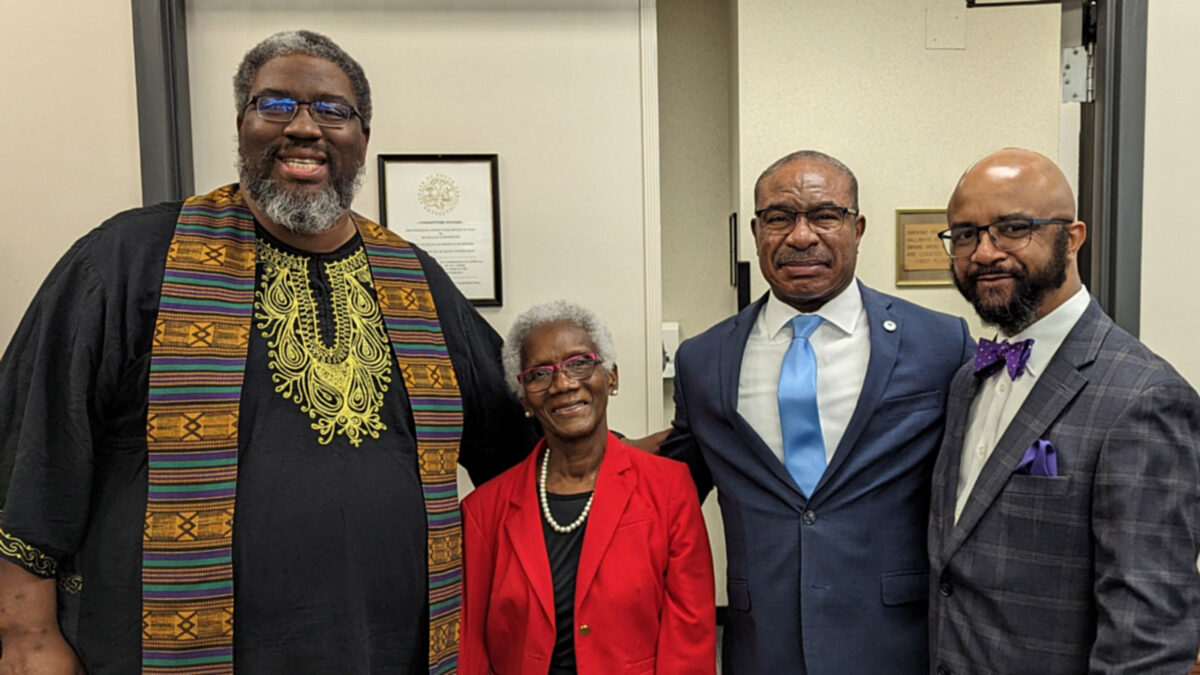
A faith-based voice
Above, The Rev. Amiri Hooker, Sandra Hamlin, the Rev. Bernie Mazyck and the Rev. Walter Strawther gather at the Statehouse after a hearing on the Unfair Trade Practice Consumer Loans Legislation currently in a Senate subcommittee.
Methodists champion consumer loan cap, challenge execution secrecy in 2023 legislative session
By Jessica Brodie
United Methodists are speaking up and speaking out about two South Carolina bills this legislative session—one to combat predatory lending and another a secrecy bill that would conceal names of companies providing lethal injections for executions.
Both bills are currently in committee as legislators consider and modify their language.
Several members of the Advocacy area of South Carolina Conference Connectional Ministries are working hard to push passage of SB 518, titled Unfair Trade Practice Consumer Loans Legislation.
The Rev. Bernie Mazyck, co-convenor of the Advocacy area and president and CEO of the South Carolina Association for Community Economic Development, called the bill a step in the right direction. In 2020, South Carolina United Methodists at Annual Conference passed a resolution to combat predatory lending, which Mazyck said “really takes advantage of the poor and marginalized citizens in South Carolina.”
This legislation, introduced by Lexington Sen. Katrina Shealy, would cap interest rates at 36 percent. Currently, Mazyck said, the highest interest being charged to someone needing a small-dollar loan in South Carolina—also called a “payday loan”—is more than 900 percent.
“This legislation will go a long way to reduce or eliminate predatory lending in South Carolina and help the poor be protected from lenders who will take advantage of their vulnerable status,” Mazyck said.
Members of the Advocacy area were asked to attend a hearing at the Statehouse in March on the legislation, and several did.
Currently, the bill is in the Labor Commerce and Industry subcommittee in the South Carolina Senate. Mazyck said the hope is it will move to the full committee and then for a vote by the Senate before heading to the South Carolina House.
He said many who charge these high interest rates say it is because of the high loss rates involved with people who take out small-dollar loans, but it’s really not necessary. He gave an example of a single mother who had a loan, but then she had an emergency and needed to get money for something else; she ended up with five concurrent payday loans open among five different companies. She would cash her check on payday, go pay something on each of the five loans—more than half her paycheck—and it didn’t leave enough to pay her mortgage. Eventually she became at risk of foreclosure.
“Scripturally based, the Old Testament says if you lend money to your neighbor you should not charge them interest, and it’s all about how we relate to our neighbors and most importantly how we relate to those who are in need,” Mazyck said.
The interest rates on these small-dollar loans tend to keep people in debt much longer than they should be, he said, and sometimes they have to get other loans to help with existing loans, so it’s a proliferation of a challenge for individuals and families who really need a hand up.
The Rev. James McDowell is one of the clergy who showed up to support the legislation at a hearing March 1, and he had the opportunity in the waiting area to speak with some lobbyists opposing the bill.
“It was a polite discussion, and they were willing to share their views and concerns in the couple of minutes we had,” McDowell said, calling his experience educational and informative.
During the meeting, there was a Methodist presence along with people from the Catholic Diocese and the Baptist church.
“I appreciated the opportunity to see how our government works as well as our conference representatives,” McDowell said. “I look forward to being more engaged in the future.”
Lethal injection secrecy bill
The Rev. Hillary Taylor, a United Methodist pastor who is also the executive director of South Carolinians for Alternatives to the Death Penalty, is also doing what she can to urge United Methodists to rally against SB 120, a lethal injection secrecy bill making its way through the legislature that would hide names from the public of pharmaceutical companies and compound pharmacies who wish to sell lethal injection drugs to South Carolina.
“Jesus was an executed person and knows the pain of being tortured to death by the state,” Taylor said.
Capital punishment researchers with the National Penalty Information Center declared 2022 the year of the botched execution, as a third of all lethal injection procedures were botched.
Beyond this, Taylor said, 190 people have exonerated from death row across the nation, pointing to issues in the justice system, and one in nine executions has something badly go wrong with it.
“People say lethal injection is a more humane way (to execute someone), but it’s not a more humane way,” Taylor said, noting how the drug can make people’s skin feel like it’s on fire, or stop their breathing by destroying lung cells and filling their lungs with blood, thereby drowning them. “Never mind that we’re pumping people with poison—this bill would also stop any means of accountability and transparency of testing drugs, as well as the amount of money the state is spending on these drugs. It makes no sense that the state is willing to go through all this effort for a process that brings no accountability or healing for victim family members.””
The bill, titled “Non Disclosure of Identity of Members of Execution Team,” passed the Senate and is now in the House. It passed the House subcommittee and the full House committee. It will now be debated on the House floor.
To see the latest on these or other bills in the legislature, visit www.scstatehouse.gov